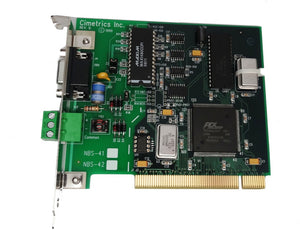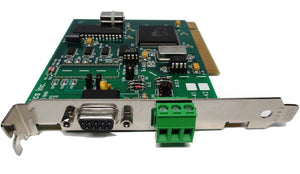$ 595.00 – Sold Out
| /
-
RS-485 Serial Device Network Interface Cards
The Cimetrics 9-bit products allow networking of serial devices - usually microcontrollers used in process instrumentation.

For those who have been using Cimetrics 9-bit NBS products for years, the NBS-41 and NBS-42 are the last PC plug-in RS-485 cards in that series. It marks more than twenty years of Cimetrics support for its 9-bit customers, and represents Cimetrics' continued commitment to legacy support.
Based on an Intel 82510 UART, the NBS-41 and NBS-42 have several features particularly suited to RS-485 multi-drop networking. Some of their special features are as follows:
- support for the 9-bit character format commonly used in microcontroller serial networks
- speeds of up to 250,000 bits/second
- built-in ESD protection reduces failures
- slew-rate limited RS-485 transceiver reduces RFI and cable termination problems
- hardware can automatically perform transmit/receive switching
- jumper selected RS-485 bus termination and biasing
- optical isolation (NBS-41 only)
These products are designed for RS-485 and simplex RS-422 networks (and NOT 4-wire RS-485 or 4-wire RS-422 networks).The NBS-41 and NBS-42 are not appropriate for data communication systems that use synchronous serial communication protocols such as HDLC, SDLC and Bitbus. Likewise, Manchester Encoding is not supported.
RS485 networks are everywhere (still).
http://en.wikipedia.org/wiki/EIA-485Many users are not so much familiar with RS485 as the protocols which travel using this signaling method. These protocols include Modbus RTU, BACnet MS/TP, ARCNET RS485, Johnson N2, Siemens P1, and Profibus.
Some protocols make use of some UARTs' capabilities to manipulate the 9th bit in a character frame to allow these "9-bit" characters to be a special part of the signaling in the protocol. This is related to the use/concept of parity in character transmission. One can think of 9-bit signaling as toggling, character by character, between mark and space versions of stuck parity.
Cimetrics itself, in the 1990s, developed a 9-bit protocol called the "NBS" or Nine Bit Solution. The NBS used the characters with the 9th bit set as node address signaling channel. This method is excellent for small and resource constrained microprocessors which need to communicate in small groups with each other - like on process industry equipment - Cimetrics' main market for NBS.
Over the years, Cimetrics has provided many NBS cards to support the Nine Bit Solution and other 9-bit protocols. This card is one of the last generation of Cimetrics NBS-x cards which support 9-bit signaling, whatever the 9-bit use may be.
Cimetrics NBS-x cards support most all common forms of RS485 signaling well. And can be used for protocols including Modbus RTU, BACnet MS/TP, ARCNET RS485, Johnson N2, Siemens P1, and Profibus.







